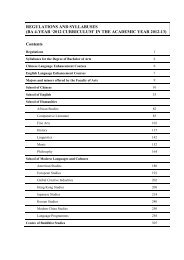Bachelor of Arts (BA) - The University of Hong Kong
Bachelor of Arts (BA) - The University of Hong Kong
Bachelor of Arts (BA) - The University of Hong Kong
Create successful ePaper yourself
Turn your PDF publications into a flip-book with our unique Google optimized e-Paper software.
325SOCI0054.Triads and organized crime (6 credits)In <strong>Hong</strong> <strong>Kong</strong>, Triads are known to have been long involved in the illegal businesses <strong>of</strong> drugs, gambling,prostitution, loan sharking, debt collecting and smuggling. Triads are also notorious for organizedextortion from legitimate businesses, such as the entertainment industry, street hawking, wholesalemarkets and minibus services, interior decoration business, the trading <strong>of</strong> properties, and the film industry.Since <strong>Hong</strong> <strong>Kong</strong> Triads are believed to be increasingly active in drug trafficking, human smuggling, andeconomic organized crime such as credit card fraud, counterfeiting, and money laundering, Westernpolice foresee that <strong>Hong</strong> <strong>Kong</strong> Triads are replacing the Italian Mafia as the most powerful criminalorganization in the world in the next century. Are these contentions correct? In order to understand whatTriads exactly do in different kinds <strong>of</strong> organized crime, this course is specifically designed to analyse therole <strong>of</strong> <strong>Hong</strong> <strong>Kong</strong> Triads in legal, illegal, and international markets.Assessment: coursework: 40%; examination: 60%.SOCI0055.A cultural study <strong>of</strong> tourisms and tourists (6 credits)<strong>The</strong> phenomenal growth <strong>of</strong> tourism in contemporary societies is <strong>of</strong> major social and culturalsignificance. This course introduces students to a cultural study <strong>of</strong> tourism viewed as a complex socialphenomenon connected with social and cultural dynamics. Special attention will be given to Asian andChinese experiences, not only as guest societies, but also as host societies.Assessment: 40% coursework, 60% examination.SOCI0056.Criminal justice: policy and practice (6 credits)This course primarily aims to familiarize students with the idea that criminal justice can be viewed as asystem consisting <strong>of</strong> interaction between three main components: police, courts, and corrections.Criminal investigation, arrest, prosecution, trial, conviction, sentence, incarceration, and communitysupervision will be examined. Attention will also be given to the formation and implementation <strong>of</strong>criminal justice policy. Students will be afforded the opportunity to explore a number <strong>of</strong> criminaljustice systems found in other parts <strong>of</strong> the world but special attention will be devoted to the <strong>Hong</strong> <strong>Kong</strong>criminal justice system.Assessment: 40% coursework, 60% examination.Prerequisite: None, but SOCI0057 recommended.SOCI0057.Crime and deviance I: an introduction to criminology (6 credits)<strong>The</strong> course introduces students to criminology as both an applied and academic discipline. <strong>The</strong> subjectmatter <strong>of</strong> criminology is diverse involving research drawn from many disciplines including medicine,law and sociology. <strong>The</strong> course begins by focusing on the state <strong>of</strong> crime in <strong>Hong</strong> <strong>Kong</strong> and introducesstudents to the operations, functions and nature <strong>of</strong> the various criminal justice agencies involved in thecontrol <strong>of</strong> crime. <strong>The</strong> course also provides a general review <strong>of</strong> the major theoretical approaches andissues in understanding and measuring crime.<strong>The</strong> course also provides an applied component which emphasizes the principles and practice <strong>of</strong>investigative interviewing - a core skill in the criminal justice system. Related topics covered toenhance the context <strong>of</strong> investigative interviewing include victimology, the investigative process and therole <strong>of</strong> forensic sciences (corroboration), and the legal rights <strong>of</strong> the suspect. Students will be required tovisit courts, prisoner treatment programmes and participate in interviewing exercises and practicums.Assessment: 50% coursework, 50% examination.
















